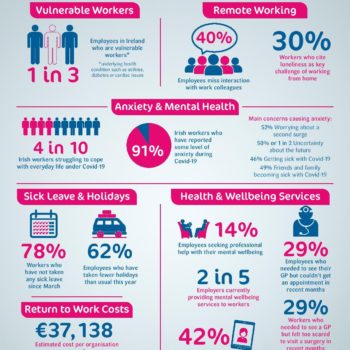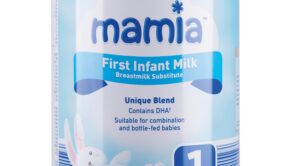Companies predict average cost of €37,138 for returning employees to workplace

One in three employees in Ireland are vulnerable workers with an underlying condition, while four in 10 Irish workers (39%) report they are struggling to cope with everyday life under Covid-19
8 September 2020
New research released by Laya Healthcare has painted a comprehensive picture of the impacts of the Covid-19 pandemic on Irish workers’ physical and mental wellbeing.
One in three employees in Ireland are vulnerable workers, with an underlying health condition such as asthma, diabetes or cardiac issues, according to the new study.
The survey — the first of its kind in Ireland to include both employers and over 1,000 employees across all industries and sectors — also found four in 10 Irish workers (39%) are struggling to cope with everyday life during Covid-19 and 91% have reported some level of anxiety.
Over half cited a fear of a second surge as their main cause of anxiety. However, just one in 10 are seeking external professional help for their mental wellbeing and almost eight in 10 workers have not taken any sick leave since March.
The research further reveals companies predict an average expense of €37,138 on returning employees to the workplace, such as putting in place new infrastructure, PPE provision and running wellness programmes. 14% of Irish employers are predicting costs of €50,000 or more. Larger organisations are more likely to be providing mental wellbeing services to support staff returning to the workplace. However, just 45% of the pharma, manufacturing and IT sectors are providing such services for those returning to the workplace and just 39% in other sectors.
“These results highlight the implications we must consider as we try to work and maintain ‘business as usual’ during a pandemic,” said Sinead Proos, head of health and wellbeing at Laya Healthcare.
“To address workers’ concerns, protect the one in three employees who are vulnerable workers and fully comply with health and safety guidelines, long-term investment in building resources, education and training needs to be made,” Proos said.
“With over 270,000 companies operating in Ireland*, the total cost of returning employees to workplaces could well be in the region of €10 billion,” she added. “The coming months are going to be incredibly challenging. Early intervention and a culture of resilience needs to be prioritised to manage people’s mental and physical wellbeing long-term — both for those working in the office and remotely. Irish employers should ask themselves, ‘is my workforce coping, and if not, do we have the right tools to support them over the coming months and years?’.”
The research conducted by Spark has been announced ahead of Laya Healthcare’s upcoming virtual event, ‘The Great Reset: A Brave New Era of Work and Wellbeing’ which takes place on 14 September 2020. The panel discussion will feature Sinead Proos, Dr Emelina Ellis, Counselling Psychologist, and employment law specialist Jennifer Cashman from Ronan Daly Jermyn law firm. It will reveal findings of one of the largest-ever research carried out among Irish employees and arm HR leaders with practical approaches and tips on implementing health and wellbeing in their own organisations. Register for the event at www.layahealthcare.ie/bravenewera.
AT A GLANCE: Further research findings
- Key challenges of working from home
The research found 30% report loneliness and isolation were the key challenges of working from home, with 40% citing reduced interaction with work colleagues.
- Impact on GP access
29% needed to see their GP but couldn’t get an appointment. The same percentage of those surveyed needed to see a GP but felt too scared to visit a surgery.
- Sick leave and holidays
Almost eight out of 10 (78%) have not taken any sick leave since March while 62% have taken fewer holidays than usual.
*(Source: According to Central Statistics Office Business Demography 2018)



 Print
Print






Fans 0
Followers